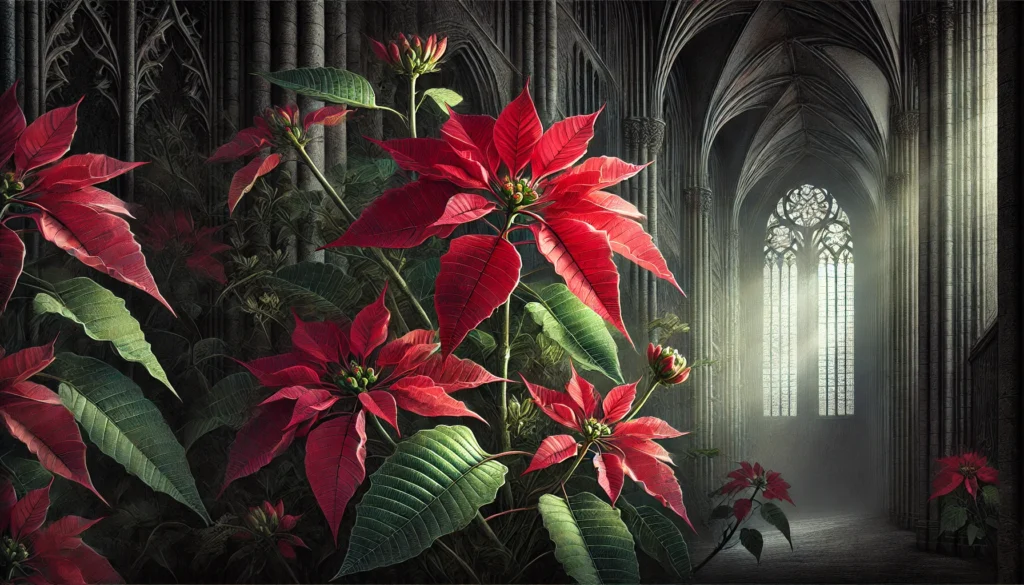

Home » Cat Plants » How Dangerous is the Poinsettia Plant for Cats?

Poinsettias are a popular holiday plant known for their vibrant red and green foliage. While they add a festive touch to homes during the winter season, many cat owners wonder if these plants pose a threat to their feline companions. Despite the common belief that poinsettias are highly toxic to cats, the reality is that they are only mildly poisonous.
Poinsettias contain a milky sap that can cause irritation to a cat’s mouth and stomach if ingested. However, the plant is not as dangerous as many other holiday plants, such as lilies or mistletoe. Poinsettias are commonly found in homes, gardens, and offices during the holiday season.
Ingestion may cause mild gastrointestinal upset, but is generally not life-threatening.
Ingestion can result in mild symptoms like vomiting, diarrhea, or drooling. Rarely fatal but may require veterinary care.
Eating these plants can lead to more pronounced symptoms like abdominal pain, lethargy, or difficulty breathing. Veterinary intervention may be necessary.
Ingesting even small amounts can cause severe symptoms like organ damage, seizures, or cardiac failure without rapid treatment.
All parts of these plants are extremely poisonous to cats and can quickly lead to death, even with immediate veterinary care.
** Please note: Please note that toxicity level can vary based on the amount ingested and the specific cat. It's always best to keep these plants completely inaccessible to cats and seek immediate veterinary care or call the poison hotline if you suspect your cat has ingested any part of a toxic plant.
If a cat ingests parts of a poinsettia plant, they may experience mild symptoms due to the irritating sap. These symptoms can include:
In most cases, these symptoms are self-limiting and will resolve on their own. However, if your cat exhibits severe or prolonged symptoms, it is best to consult with your veterinarian.
If you suspect your cat has ingested poinsettia and is showing symptoms, your veterinarian will likely perform the following steps to diagnose and treat the issue:
For more information on what to do if your cat ingests a potentially poisonous plant, visit the ASPCA Animal Poison Control Center.

A: Yes, Poinsettia is mildly toxic to cats. Although it is often overestimated, ingestion can still cause symptoms like vomiting, drooling, and mild gastrointestinal discomfort.
A: If a cat eats poinsettia, it may experience mild symptoms such as vomiting and drooling. Immediate veterinary care is typically not necessary unless symptoms become severe, but monitoring is advised.
A: Yes, all parts of the Poinsettia plant, including the leaves and stems, are mildly toxic to cats. The plant’s milky sap can irritate a cat’s mouth and stomach.
A: Even small amounts of Poinsettia can be harmful to cats, though the effects are usually mild. It’s best to keep this plant out of reach to avoid any potential reactions.
A: Poinsettia toxicity is rarely fatal in cats. Most cases result in mild symptoms, but prompt attention can help ensure a smooth recovery.
A: If your cat ingests Poinsettia, monitor for symptoms like vomiting or drooling. Contact your veterinarian if symptoms worsen or if your cat appears to be in distress.
Poinsettias, native to Mexico, have been cultivated for centuries. The plant’s association with Christmas began in the 16th century when Franciscan monks in Mexico incorporated the plant into their Christmas celebrations. The plant’s star-shaped leaves were seen as a symbol of the Star of Bethlehem.
In the early 1800s, Joel Roberts Poinsett, the first U.S. Ambassador to Mexico, introduced the plant to the United States. The plant was later named after him, becoming known as the poinsettia. Today, poinsettias are widely cultivated and sold as ornamental plants during the holiday season.
Please note: The information shared in this post is for informational purposes only and should not be considered as veterinary medical advice.
🐾 A hilarious or heart-melting cat video
🐾 Our latest paws-on review of a cool cat toy